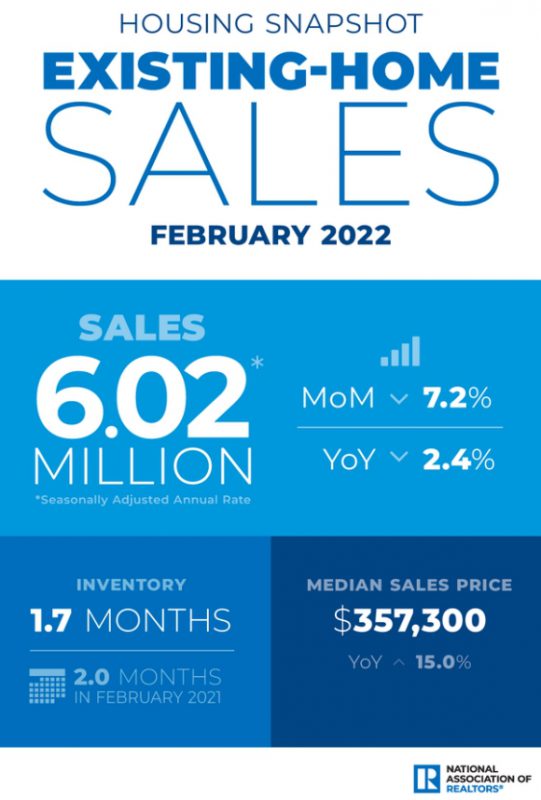| According to the National Association of Realtors® recent Existing Home Sales report, the median existing-home price for all housing types in February was $357,300, up 15.0% from February 2021 ($310,600), as prices grew in each region. This marks 120 consecutive months of year-over-year increases, the longest-running streak on record.
Properties typically remained on the market for 18 days in February, down from 19 days in January and 20 days in February 2021. Eighty-four percent of homes sold in February 2022 were on the market for less than a month. First-time buyers were responsible for 29% of sales in February, up from 27% in January and down from 31% in February 2021. NAR’s 2021 Profile of Home Buyers and Sellers – released in late 20214 – reported that the annual share of first-time buyers was 34%. Individual investors or second-home buyers, who make up many cash sales, purchased 19% of homes in February, down from 22% in January but up from 17% in February 2021. All-cash sales accounted for 25% of transactions in February, down from 27% in January and up from 22% in February 2021. Distressed sales – foreclosures and short sales – represented less than 1% of sales in February, equal to the percentage seen in both January 2022 and February 2021. Total existing-home sales, completed transactions that include single-family homes, townhomes, condominiums and co-ops, sank 7.2% from January to a seasonally adjusted annual rate of 6.02 million in February. Year-over-year, sales decreased 2.4% (6.17 million in February 2021). What Happened to Rates Last Week? |
| Mortgage backed securities (FNMA 3.50 MBS) lost -69 basis points (BPS) from last Friday’s close which caused fixed mortgage rates to move much higher compared to the prior week. The lowest rates of the week were on Monday and the highest rates were on Thursday.
Here are some key economic releases from last week:
The Talking Fed: We got their Interest Rate and Policy Statement on Wednesday, You can read their official statement here. and their Economic Projections, you can read their projections here. Here are some key highlights that the bond market focused on:
Retail Sales: February Retail Sales were not as bad as the headlines suggest. MOM, Retail Sales were up 0.3% vs est of 0.4% however the prior month a large revision from 3.8% to 4.9%. Ex Autos, it was up 0.2% which would appear to be a big miss compared to expectations of 0.9% but the prior month was revised from 3.3% to 4.4%. Inflation Nation: February headline Producer Price Index (PPI) increased by 10.0% on a YOY basis. This is the FIRST time that the index has seen double-digits since it began. January’s pace was 9.7%. However, the 10% gain was what the market expected. Ex food and energy, the Core PPI YOY increased by 8.4% which is stronger than January’s pace of 8.3% but was below forecasts of 8.7%. |
 The above are the major economic reports that will hit the market this week. They each have the ability to affect the pricing of Mortgage Backed Securities and therefore, interest rates for Government and Conventional mortgages. I will be watching these reports closely for you and let you know if there are any big surprises. It is virtually impossible for you to keep track of what is going on with the economy and other events that can impact the housing and mortgage markets. Just leave it to me, I monitor the live trading of Mortgage Backed Securities which are the only thing government and conventional mortgage rates are based upon. |


